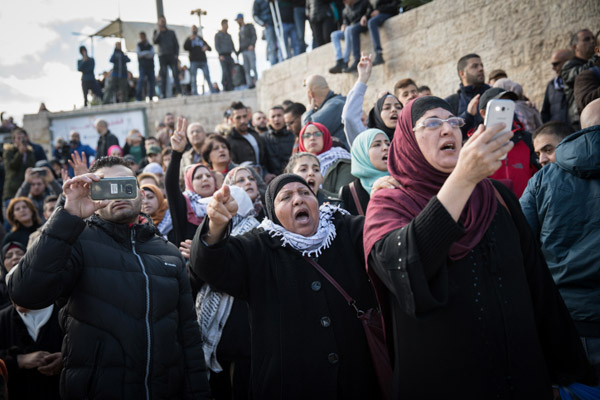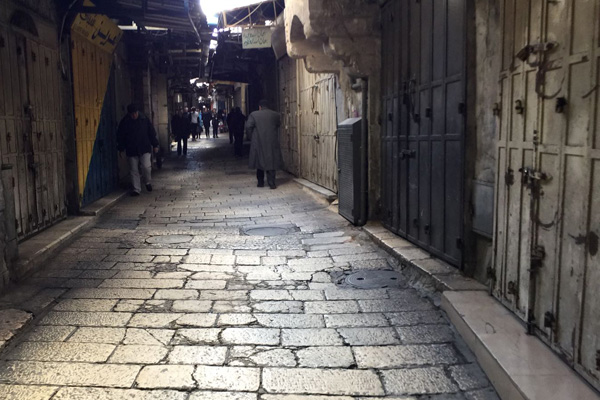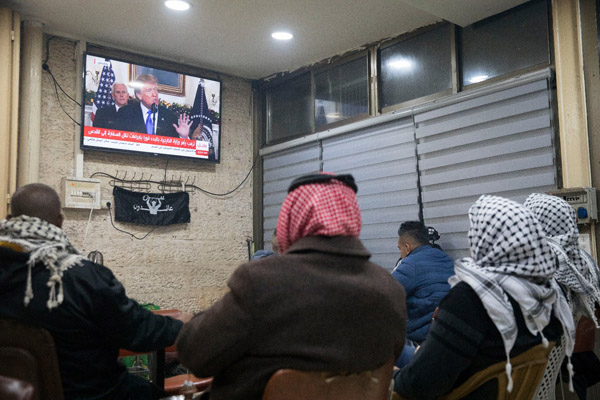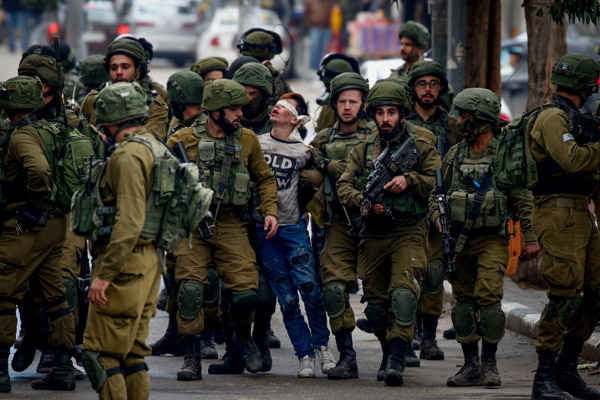Palestinian activists from across East Jerusalem react to Donald Trump’s recognition of Jerusalem as the capital of Israel. Will it lead to tangible change? Will there be an uprising? What should the Palestinian leadership do?
By Michael Salisbury-Corech, Alma Biblash, and Yali (Yael) Marom

Donald Trump’s announcement recognizing Jerusalem as the capital of Israel and initiating the move of the American embassy was received with cheers and applause by the Israeli leadership and with threats and calls for protests by the Palestinian leadership. Absent were the voices of the residents of East Jerusalem—hundreds of thousands of people treated as political pawns, for whom no one is willing to take responsibility; no American president or Israeli prime minister asks about their opinions, their wants, or their well-being before making decisions.
Even before the official announcement, the streets of Jerusalem were empty on Wednesday. The cold, the rain, and mainly the warnings from various consulates to their citizens to stay away from the area had left the city desolate. Taxi drivers we spoke with told us that the tourists had disappeared from the streets. Journalists and photographers sent to the city by international media quickly took the tourists’ places—they always arrive when the smell of violence is in the air.
This morning a general strike was declared in East Jerusalem and other Palestinian cities. The shops in the Old City all were closed; the streets, empty. A strike was also declared in the city’s schools. There have been protests across the West Bank as well as Jerusalem. At the time of writing Israeli forces had wounded dozens of Palestinians.
Over the past two days, we asked Palestinian activists from neighborhoods across East Jerusalem about their thoughts on Trump’s announcement. We asked them about their fears, about life in the city and the possible consequences of the announcement. About the expectations they have or don’t have of the Palestinian Authority, and ongoing efforts to organize protests.

‘We Jerusalemites don’t have weapons, we have the streets’
Mohammed Abu Humus, an activist from the neighborhood of Issawiya, does not understand why Israelis are celebrating. “I don’t know why this announcement is important to Israelis. They already occupy Jerusalem, so what is this announcement going to change? Moreover, can Israeli citizens, not to mention government ministers and members of Knesset, walk freely in East Jerusalem just like on Yafo Street in West Jerusalem? What kind of capital city is that?”
It is clear to him that Trump’s decision will only bring trouble. “I believe an intifada will break out. We have always stood alone against Israel, and we will continue to struggle even if the entire world doesn’t recognize our rights.”
Like the other East Jerusalemites with whom we spoke, Abu Humus recalled the victory won by protests against the metal detectors that Israel set up at the entrance to the Temple Mount this past July. “Those were Jerusalemites who went out to protest and won. There, Israel understood that it could not win by force. Today, it’s not the leaders who are in control: the people on the ground have taken the lead. We Jerusalemites don’t have weapons but we have the street. All of the resistance organizations will bring people out into the streets—not just in Ramallah but also in Jerusalem, not just in Gaza but also in Hebron.”
What will the PA do?
“How much time does he have left to live, our leader Abu Mazen? A week? A month? A year? He will never be willing to end his career as someone who silently accepted this announcement,” Abu Humus continues. “He learned from his friend Arafat, who said during the Second Intifada, ‘I will stay in the Muqata’a [the presidential compound in Ramallah], and if I am made a martyr, so be it.’ But there are also welcome results of this announcement. It will unify the Palestinians. Because of Trump, now Abu Mazen and [Hamas leader] Haniyeh are working together, trying to figure out how to respond.”

‘The Arab leaders sold us out’
Jawad Siyam, who runs the Wadi Hilweh Information Center in Silwan, thanked Trump for stripping away the mask: “As Palestinians, we all know that the Israeli project would never have been born over the past hundred years if it were not for Arab leaders who bent to the will of Western colonialism, especially Saudi Arabia, ‘the Kingdom of Corruption.’ These leaders were never faithful to Palestine. They’re the ones who sold us out. Trump just connected the dots.”
According to Siyam, this is the end of the U.S.-brokered peace process: “This unjust political decision will require the Palestinian people and its leadership to break free from the idea of American stewardship of the peace process. The American government propped up the longest occupation of the modern era, an occupation that abuses the Palestinians without restraint. As injustice grows, so does the will to rise up.”
Of political organizing in East Jerusalem in response to the American presidential declaration, Siyam had to say: “Trump forgot Netanyahu’s last humiliation at the gates of Al-Aqsa. He forgot that while the Palestinians may not be able to agree amongst themselves about anything, there is one thing that unites them: Jerusalem. Trump and others, therefore, will have to ask for help to get out of this mess.”
‘Why now?’
Hoda (not her real name), a journalist from Beit Hanina, told us about coping with a deep sense of uncertainty: “One day, a man can wake up in Washington and make declarations that change my entire life. Who is he to make a decision like this for the whole world? Is he trying to start another cycle of violence? Why now?”
For Hoda, however, it is more important to speak about the everyday, about police brutality against the residents of the neighborhood, about feeling like a stranger in her own city, and about the lack of freedom of movement: “There are declarations and then there’s what happens in our everyday lives. What’s important is that the police stake out our neighborhood as a ‘show of force’ as you, Israelis call it, and hand out tickets and fines. What’s important is that they destroyed another home in Shuafat and that families in Sheikh Jarrah are facing eviction, that people don’t have work, that they can’t leave this place when they want without a permit, that there’s no one looking out for them.”
Hoda tells us that activist Whatsapp groups are buzzing with rage: “There are a ton of meetings. It’s clear to everyone that we have to do something, that we need to get out into the streets and protest, that we need to be creative this time. But who exactly will we demonstrate against? Trump isn’t here to take responsibility for his declaration.”
Mohammed Kareen, a social activist from Silwan, said that the declaration won’t affect the lives of ordinary Palestinians in East Jerusalem. “We live under occupation. No declaration will change that. I believe there will be protests in the occupied territories and in Jerusalem until we get used to it, and then they’ll stop. There’s a difference between this and what happened on the Temple Mount. The metal detectors that they put on the Temple Mount caused a change on the ground, a shift in authority. Here, I don’t see any change for the ordinary Palestinian who lives in the city. I understand this as something significant on the political level.”
‘They won’t force this decision on us’
Jihad Abu Znid, a member of the Palestinian Legislative Council, describes Trump’s decision as racist, noting that “it comes from a country that claims to be a democracy, and even stands first among democracies around the world.”
It’s clear to her that the struggle is just beginning, and called for civil response: “From the prospective of the Palestinians and the Jerusalemites, this decision will not pass. We learned a few lessons, the most important of which is that it is we who determine our own fate, and that we won’t wait for the United States to force its instructions upon us.”
“Our response will be civil. As a Jerusalemite, I feel strength and pride because I am completely sure that the United States will not force this decision upon us successfully. We fought against the metal detectors with popular protest, and we will do it now. This announcement will increase our strength. The residents of Jerusalem will rise up and reverse the decision.”
‘There’s no hope for peace’
According to Bahri Abu Diab, an activist from Silwan, Trump’s announcement is a kind of awakening: “Trump’s declaration contradicts international law, which recognizes East Jerusalem as occupied, and this means that the United States is willing to violate international law. Instead of declaring Jerusalem the capital of both nations, Trump went and shut the whole thing down. Which is to say that the hope, the light at the end of the tunnel, the possibility that we will have our state with Jerusalem as its capital, and peace—is buried. We have discovered that the light at the end of the tunnel was actually the light of the bulldozer that came, again, to destroy.”
So what now? What’s the next step?
“I say this sadly, that the only response is escalation. If we have nothing to lose, it will be chaos. If they crush our hope, everything falls apart. We can’t teach our children that peace and coexistence will win-out when they learn from Trump that only force works. That what we lost by force we can only win back by force, because we won’t gain a thing through negotiations. The meaning of recognizing Jerusalem as the capital of Israel is that we are going to lose our holy sites—and on this, we’ll never compromise. It seems to me that the future will be very dark, and I say this with pain. If Palestinians decide to resist with violence, how can we argue with them? We, the moderates, don’t have an answer to those who think that violence will solve the problem. We cannot tell them that there’s another way, a peaceful way.”

‘They don’t give a damn about us’
Salah Diab, an activist from Sheikh Jarrah, is furious. He is angry at Trump: “He acts like this is a game for him but he can’t made decisions about the future of this country. He can’t decide for Muslims who will control Jerusalem. Netanyahu and Trump might think that Jerusalem and Al-Aqsa are just a Palestinian matter; they’re forgetting that there are a billion Muslims in the world.”
He is also angry at Abu Mazen. “In my opinion, [Abbas] works for Israel and America, he and [Egyptian President] a-Sisi and the Saudis. He sold himself and our people out long before Trump’s decision. I don’t know how he’ll respond, but I don’t have high expectations.”
“I am a simple man. I was born simple and I want to die free,” Diab continues. “I want to live a good life, with safety and security, just like every human being on the face of the earth. The feeling is that the Israelis and the Americans are trying to start World War Three. The whole world wants two states, each with their capital in Jerusalem, but they screwed us all over and in the process are destroying any chance of peace. Jerusalem influences the entire world. Peace emanates from Jerusalem to the rest of the world—but so does war.”
This article was first published in Hebrew on Local Call. Read it here. Thank you to Dima Darausha who assisted in the translation from Arabic.
